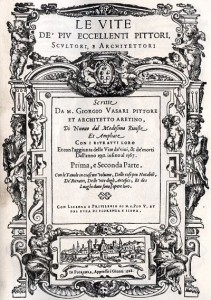Florence, Kunsthistorisches Institut in Florenz – Max-Planck-Institut, 14. – 16.02.2014
Deadline-CFP: 15 sept. 2013
Vasari als Paradigma. Rezeption, Kritik, Perspektiven
The Paradigm of Vasari. Reception, Criticism, Perspectives
Conference organized by Alessandro Nova and Fabian Jonietz
 For the past decade and a half, numerous research projects have rededicated themselves to the key sources of art history and to editing and commenting on early art historiographical writings (Vasari, Bellori, Sandrart, Malvasia). One main difference between earlier attempts which dealt with these authors is a current approach which no longer concentrates on factual and documentary evidence alone, but which aims to reveal the narrative models and literary strategies of such texts as well. This fact may be connected to the self-reflexive modes of modern art historical studies and the attention to its own narrative traditions. Hans Belting’s « The End of the History of Art? » (1983), in particular, led to general questions regarding art historical methodologies – which were followed by various attempts to define the discipline in a new way (under diverging rubrics such as e.g. « kunsthistorische », « kunstwissenschaftliche », « bildhistorische » or « bildwissenschaftliche Forschung » in German scholarship).
For the past decade and a half, numerous research projects have rededicated themselves to the key sources of art history and to editing and commenting on early art historiographical writings (Vasari, Bellori, Sandrart, Malvasia). One main difference between earlier attempts which dealt with these authors is a current approach which no longer concentrates on factual and documentary evidence alone, but which aims to reveal the narrative models and literary strategies of such texts as well. This fact may be connected to the self-reflexive modes of modern art historical studies and the attention to its own narrative traditions. Hans Belting’s « The End of the History of Art? » (1983), in particular, led to general questions regarding art historical methodologies – which were followed by various attempts to define the discipline in a new way (under diverging rubrics such as e.g. « kunsthistorische », « kunstwissenschaftliche », « bildhistorische » or « bildwissenschaftliche Forschung » in German scholarship).
The « Lives » of Giorgio Vasari, published in 1550 and 1568 respectively, have to be acknowledged as an inevitable center of all of these discussions. As a purposeful continuation, the implicit model of reference or the decided rejection, Vasari serves as paradigm to all art historical writings of both the early modern period and modernity. The issues of current art historians (regarding questions such as how specific approaches to works of art are conditioned or how historical processes can be translated into a narrative) are particularly linked to art history’s own traditions as an academic discipline, which in many ways continued Vasari’s narrative: Such is the case of Jacob Burckhardt, who composed his works using excerpts from the « Lives » (« 700 tiny notes just with quotations from Vasari […] cut out and put into order »), Anton Springer and Herman Grimm, transforming the artist’s biography into a 19th-century bestseller, and many more. And even if there have been numerous attempts to renounce the ‘Vasari’ of this older tradition, many of the key concepts of the « Lives » still persist as models in current scholarship, being more present (‘Renaissance’) or less (e.g. the artistic ‘school’ of a person or region), intensely discussed or almost ignored.
This conference aims for the first time to review Vasari’s role in the formation of theoretical concepts and practices of later ‘art histories’ in its entirety. The proposed time frame covers his early modern followers (besides those authors already mentioned above e.g. Van Mander, Houbraken, Dézallier d’Argenville or Fuseli) as well as the intensive discussion of the « Lives » in the 19th century, when the critique regarding Vasari’s truthfulness led to historical contextualization by Gaetano Milanesi, Carl Frey and Wolfgang Kallab. Not only will national differences in the reception of Vasari’s work have to be considered, but also how this transformed view of Vasari from 1870/1900 influenced the generation of Warburg, Panofsky and Gombrich, whose studies shaped the modern art historical discipline more than any other. By doing so, this look at the « Lives » as model will hopefully explain what relevance Vasari’s concepts still hold for today’s interests and practices of art historical studies. Even more crucial, however, is the question of whether the critical revision of this art historiographical model might also open new perspectives for future challenges of art historical studies.
Interested applicants should send their proposals of max. 500 words (in German, English or Italian) and a current CV to Alessandro Nova (dirnova@khi.fi.it) and Fabian Jonietz (fabian.jonietz@khi.fi.it) before September 15, 2013.
URL de référence : http://arthist.net/archive/5779

Leave a Reply
You must be logged in to post a comment.